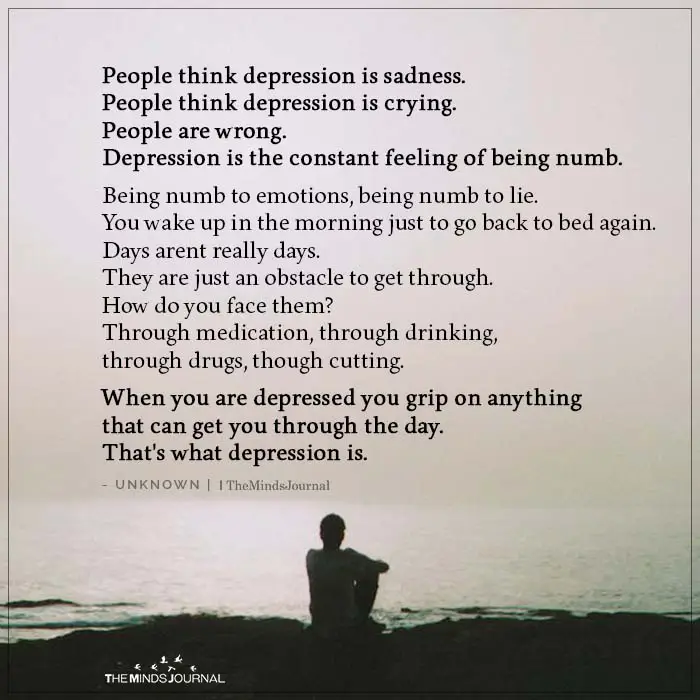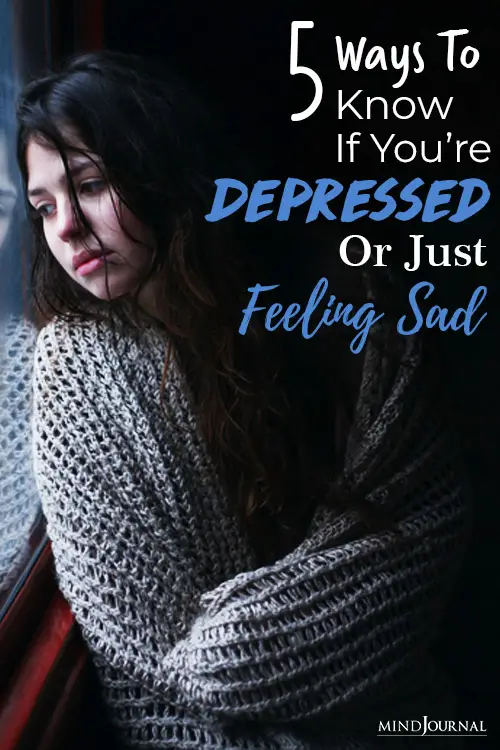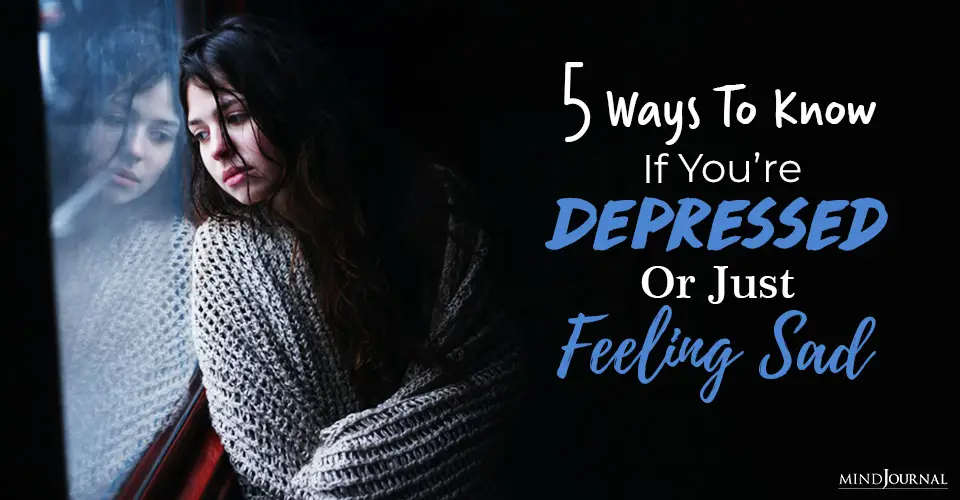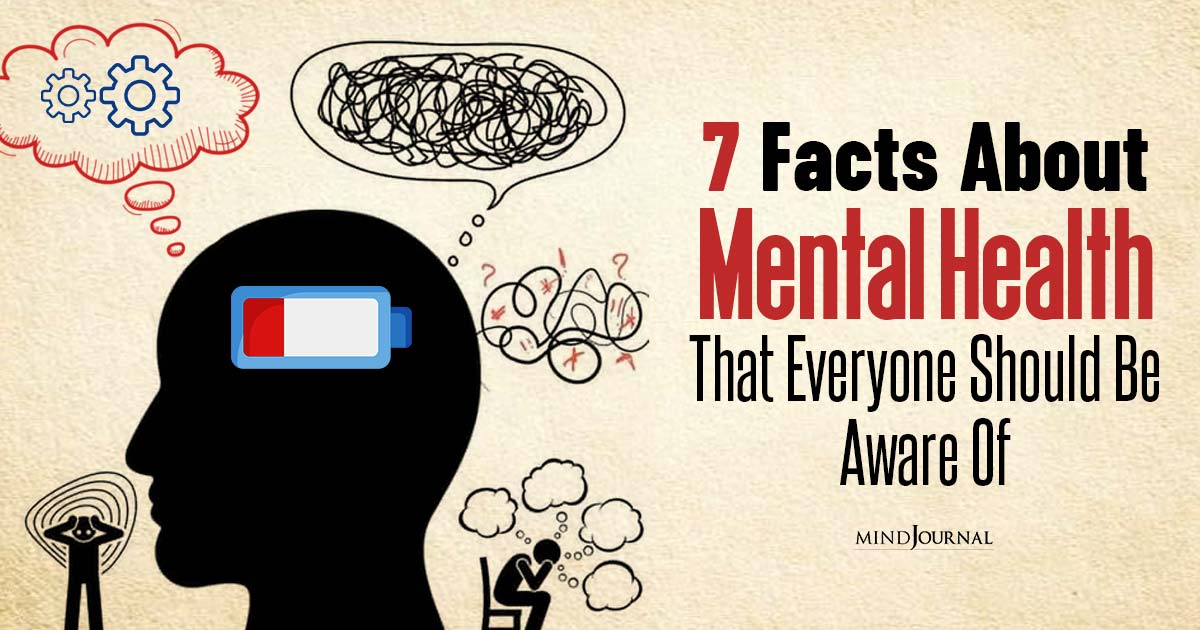Many of us, when we are feeling down about our lives or ourselves, wonder if we are depressed or just sad? Should we be worried about our mood or should we just ride it out?’
There is a fine line between being sad and being depressed. Knowing the differences is key to knowing how to manage and treat how you are feeling.
While there are many different variations of depression, there are two fundamental forms. Chemical depression, depression caused by a chemical imbalance in your brain, one that is often genetic or the result of trauma. Situational depression is usually a short-term sadness, often brought on by a life event.
Which one are you struggling with? There are some way to tell. Here are 5 of them.
Here Are 5 Ways To Know If You Are Depressed Or Just Sad
1. Has Something Happened?
One way to tell if you are depressed or just sad is to consider what is happening in your life right now.
Has your dog died? Is a parent sick? Have you lost your job? Did you have a car accident?
Sometimes, life events happen that make us feel overwhelmed and sad. It happens. And the result of those life events can cause situational depression, a short-term feeling of depression, one that feels bad but will most likely pass.
The key thing to ask yourself, if you are wondering if you are depressed or just sad, is if you felt this way before this thing, or things, happened or did your mood change because of the event. If you were fine before the event happened, then you are most likely just sad and the depression will pass with time.
If you were feeling this way before, you just might be dealing with chemical depression so read on!
Related: The Fundamental Differences between Sadness and Depression
2. Have You Been Feeling Down For A While?
Of course, after your dog dies, you are going to feel sad for a while. Just looking at the chair that they slept on can send you down into a dark hole. But, with time, while the pain and sadness are still there, it will ease and you will be able to go on with your life.
If you find that you aren’t feeling better with time but in fact are feeling the same or worse, then it could be that you are dealing with chemical depression. A depression caused by something more systemic than a life event.
So, try to look back on the past few days, weeks, months and years and see where your moods have been. Have you been up and down, as life throws its curveballs at you, or do you find that you have been down more often than up?
If you can’t remember how the past period of time has been, start keeping a mood chart. Keep track, on a daily basis, how your mood is.
On a scale of 1-10, keep track of where your mood is each day, 10 being great, 1 being horrible. This way, you will have a record of your moods and you can watch what happens to them.
If you are consistently below a 5, then that’s a piece of information. If you are up and down the whole spectrum, that’s another piece of information.
You can use this information to help yourself, or your doctor or your friends, understand what is happening with your moods so that you can figure out how to deal with them.

3. Are You Feeling Hopeless?
The hallmark of chemical depression is hopelessness. That feeling that you will never be happy again, that you will never love or be loved, that life isn’t worth living and why should you even bother, anyway. I am not saying you are suicidal (although you might be) but you are definitely questioning everything that life has to offer.
When we are struggling with sadness, with situational depression, generally our outlook isn’t hopelessness. When my dog died, I was sad but I didn’t struggle with questioning my life or examining my choices. I was just sad that she wasn’t here with me and I missed her. I miss her still but now I have a cat and I am happy.
So, if you find that you are struggling with hopelessness and despair, you might consider that you are struggling with more than just sadness and that it’s time to get help.
Related: 5 Signs You Are Not Depressed, But Surrounded By Toxic Assholes
4. Is It Getting Worse?
Depression gets worse the longer it goes untreated. It’s a sad fact but it’s true.
Do you find that your depression is worsening over time? Has it come and gone in recent years but are you finding that it is present more often than not? Are you finding it harder to deal with than before?
Usually, when we are sad, our sadness doesn’t progressively get worse. Instead, it gets better. When my mom died, the first few weeks and months were incredibly painful. I was sad sad sad. But, as life has gone on and time has passed, my sadness has lessened. Yes, I still have moments when I am deeply sad but that sadness passes. It certainly hasn’t gotten worse.
If you find that your down mood is getting worse and not better, you might definitely be struggling with depression and learning how to manage it is important.
Related: The Difference Between Sadness And Depression
5. Does Depression Run In Your Family?
In my family, depression goes back generations. My great grandfather was institutionalized for 40 years and my grandfather was subjected to horrific treatments in the ’50s. I was diagnosed with depression when I was 42 and learned then that, in many cases, depression, and other mood disorders, are passed down in the family.
Of course, families can struggle with situational depression. My siblings and my kids were as devastated as I was about my mom’s death and we all struggled. But we have all been able to move forward and not have the sadness affect our lives.
Consider your family. Does your mother or your sister struggle with their moods? Does your dad get angry easily or your child disappear into their rooms some days? It is very likely that, if someone else in your family struggles as you do, then you very well might be chemically depressed and it might be time to get help.
Knowing if you are depressed or just sad is a key part to figuring out how to manage it.
If you find that nothing significant has happened in your life, that your hopelessness has been with you for a while and is getting worse, and if mood disorders run in your family, then you might be struggling with chemical depression. And if you are dealing with chemical depression, reach out to your primary care doctor to see what kind of treatment they might recommend helping you manage it.
If you are sad because of a recent loss in your life or something that has happened but your sadness hasn’t lasted for a long time or is getting worse, then you might be dealing with situational depression. I would encourage you to take care of yourself, eat and sleep well, exercise, and see if it passes with time.
If it doesn’t, again, reach out to your primary care doctor and see what they might recommend to help you get though this rough period of time.
Depression and sadness don’t have to hold you back from living your life! Face them head on, learn how to manage them and move forward. You will be ok!
If you found this article helpful, let me help you dig a little bit deeper with a FREE SESSION. The session is absolutely obligation-free and even one session can make a big difference. Schedule Now.
Check out my new course, 4 Weeks to Letting Go of Love and Moving On. Let me help you get past the pain of your broken heart, get to know yourself again, and move on! Learn More.
Written By Mitzi Bockmann Originally Appeared In Let Your Dreams Begin









Leave a Reply
You must be logged in to post a comment.